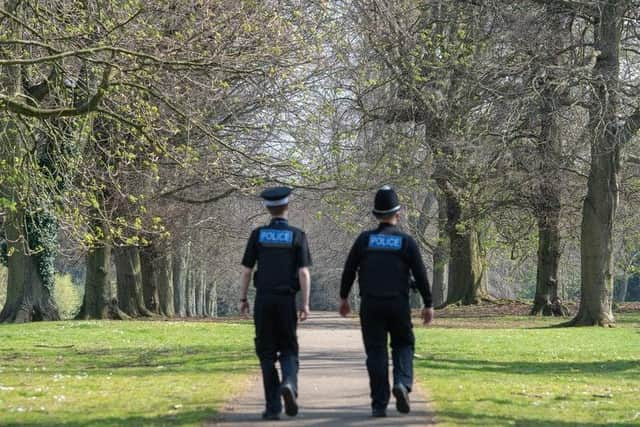BAME people in South Yorkshire nearly four times as likely to get Covid lockdown fines than white people
and live on Freeview channel 276
The National Police Chiefs' Council says it is concerned by ‘disproportionality’ in the issuing of fixed penalty notices by forces in England and Wales, but added the picture is complex with wide variation across the two countries.
Figures published by the NPCC show South Yorkshire Police handed out 367 fines between March 27 and May 25.
Advertisement
Hide AdAdvertisement
Hide AdOf those, 238 were to white people and 101 to those of black, Asian or minority ethnic backgrounds.


Analysis carried out by Government statisticians for the NPCC suggests that people from BAME backgrounds were fined at a rate of 7.3 in every 10,000 people, compared to 1.9 in every 10,000 white people.
That means fines for BAME people were 3.8 times higher than for white people – well above the national average of 1.6.
Rates were calculated using police force area population estimates from mid-2016 – the latest year with an ethnicity breakdown. The figures include residents as well as those who travelled to the area.
Advertisement
Hide AdAdvertisement
Hide AdNPCC chairman Martin Hewitt said: “While it is a complex picture, it is a concern to see disparity between white and black, Asian or ethnic minority people.
“Each force will be looking at this carefully to assess and mitigate any risks of bias – conscious or unconscious – and to minimise disproportionate impact wherever possible.
He added that the NPCC is working towards a plan of action to address issues of inclusion and race equality, such as lower trust in police from black communities and concerns around the use of stop and search.
Analysis showed huge variation in the number of fines issued in different areas of the country, with rates generally higher in coastal areas and beauty spots.
Advertisement
Hide AdAdvertisement
Hide AdBut it found those areas typically have relatively small BAME populations, meaning a small number of fines issued to BAME people could lead to high disparity rates.
South Yorkshire Police said: “We always aim to ensure that anyone who comes into contact with South Yorkshire Police is treated fairly and equally.
“Our approach during this difficult period of restriction and isolation has always been to engage with people, explain the current Government restrictions and advice, and encourage them to adhere to what is being asked of them in order to protect themselves and others. The vast majority of people have adhered to these guidelines, and whilst engagement has always been the preferred option, we have issued fines as a response to persistent or blatant breaches of restrictions.
“Where a Fixed Penalty Notice has been issued, our officers have always had reasonable grounds to do so. Each FPN issued has been reviewed by the force legal department.
Advertisement
Hide AdAdvertisement
Hide Ad“Between March 27 and May 25, 2020, as a force we issued 367 FPNs. Of these, 101 were issued to individuals from BAME communities.
“We have procedures in place which allow us to routinely scrutinise, review and refine our performance and we will take these figures into account to inform our practices moving forward.
“We strive to continuously learn and improve, and we will continue to listen to, and work with, our communities in order to tackle bias, racism or discrimination wherever we find it.”